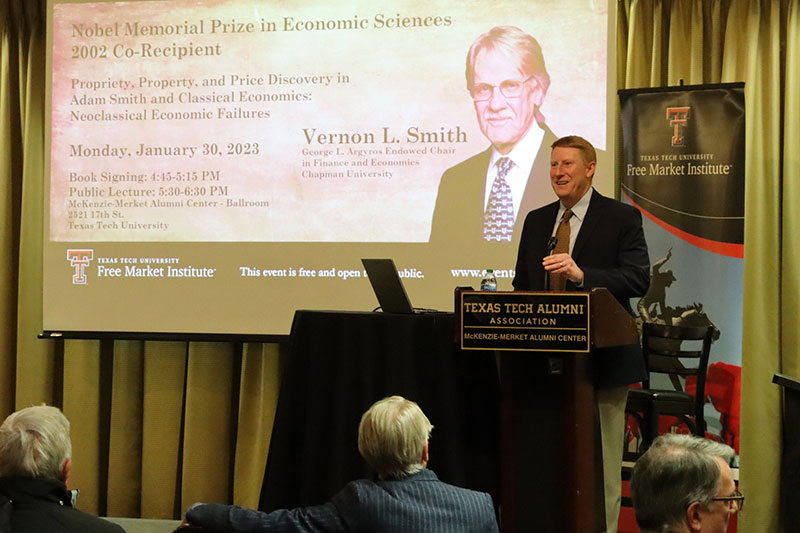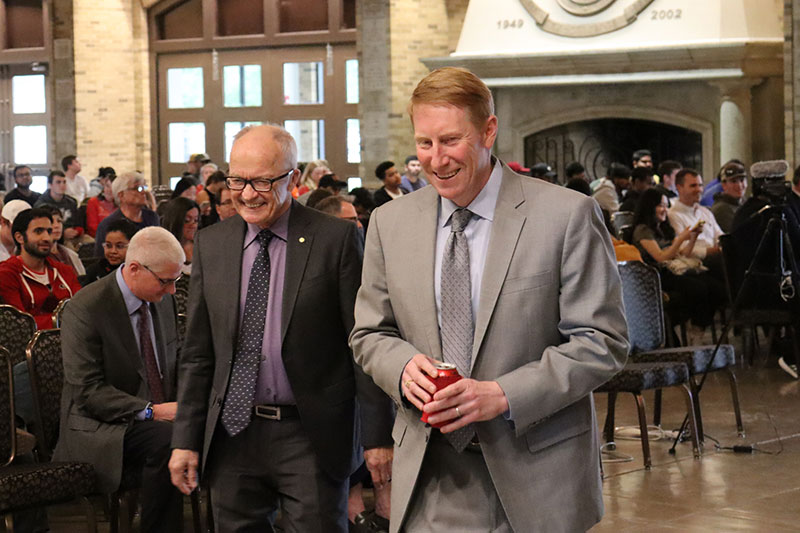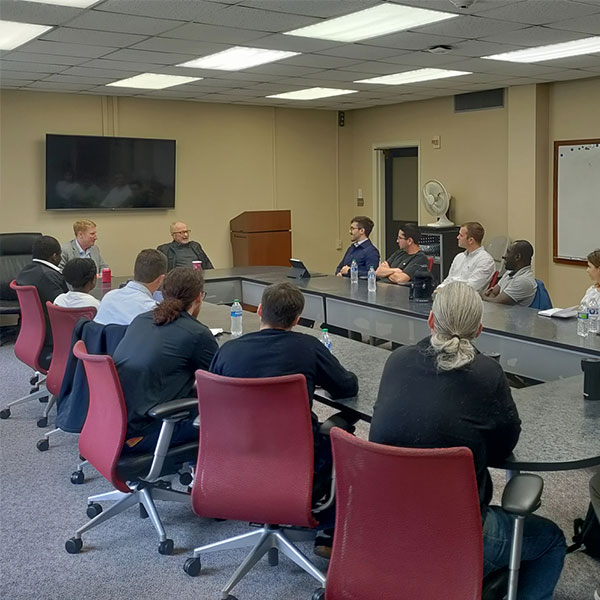
If you ask Matt Matthews why he wanted to fund the Free Market Institute (FMI) at Texas Tech University, his answer is a very simple one: “Freedom.”
A decade ago, Matthews saw a need to help protect the economic freedoms he and most Americans hold dear, so he thought he would do something about it.
“I was born into a ranching family, which was probably the truest example of a free market and the laws of supply and demand,” Matthews said.
He wanted to protect the free markets and thought a good way to do that was through education. So Matthews approached then College of Arts & Sciences Dean Lawrence Schovanec. Together they built the concept of the Free Market Institute.
A decade in, the FMI is flourishing.
Designed as a unit dedicated to advancing the teaching and research of free markets and the institutions needed for them to function, the FMI has become one of the largest centers of its kind in the country, and the biggest in Texas.
“The first 10 years of the Free Market Institute have been great,” said FMI Executive Director Benjamin Powell. “We went from a small startup to probably the second-largest collection of faculty and Ph.D. students of our type in the country, and that's the primary goal of the Free Market Institute.”

The growth of the FMI has even seen the concept expanded across the Texas Tech University System (TTU System) by adding a center at Angelo State University in San Angelo.
A large part of the FMI's mission is to train future professors. While similar programs across the country are often isolated in economics or business departments the FMI reaches across multiple colleges to create a well-rounded perspective for future educators and thought leaders.
“The Free Market Institute is really about the study of the free enterprise system from an explanatory perspective,” said FMI faculty member Alexander Salter, who has a dual appointment with the Jerry S. Rawls College of Business. “How does it actually work? And especially, how do the institutions that support it work?
“We want to understand the system that we operate in to try and figure out exactly what the rules of the game are. What rules of the game promote social flourishing and what rules of the game cannot promote social flourishing? It's a perspective that you don't often see.”
Because of the scope of the institute at Texas Tech, students involved with the FMI come away with knowledge and perspectives ranging from political science to the economy of agriculture and everything in between. They also get the hands-on training they need to become successful professionals.
“They do a very good job of not really letting anybody fall through the cracks,” FMI doctoral student Vincent Miozzi said. “You get students paired with different faculty, whatever your interests are across a broad variety of research ideas, and they get you writing and in front of other students and academics to present and get feedback before you even go out into a professional conference setting. That gives us a big leg up.”

With faculty representing Rawls College, the College of Arts & Sciences, Davis College of Agricultural Sciences & Natural Resources and faculty affiliates at the Texas Tech University Health Sciences Center, the FMI reaches across all of Texas Tech's campus.
As Powell explained: “It's a unique multi-disciplinary collection of scholars who are all interested in some of the same core political economy ideas.”
While the FMI primarily creates value by training doctoral students, that isn't the sole focus of the center. Undergraduates get involved with the FMI as well and community outreach plays a big part in what they do. By widely sharing free-market ideals with events and lectures open to wider audiences, the FMI has become a valuable part of the West Texas community.
The lecture series, which in 2023 already has brought two Nobel prize winners to campus, is a point of pride for the institute and a valuable source of knowledge. And for several years Powell hosted “Free to Exchange,” an interview-based program on Texas Tech Public Media's television station KTTZ-TV. The show allowed regional institutions and visiting scholars to share their perspectives on a range of economic and public policy issues with a wide audience in West Texas.
The availability to the community and mixture of ideas across multiple disciplines is really what makes the FMI thrive. In its first decade the institute has become a leader in producing and promoting free-market thought leaders.
“The Free Market Institute has brought to Texas Tech world-class scholars and increased undergraduate and graduate student exposure to how our markets work,” said Schovanec, now president of Texas Tech. “Because of the support of many, the institute has grown its educational and outreach impact and has become a point of pride, both within our local community and within the larger realm of free-enterprise scholarship.”
And there is no plan to stop growing any time soon.
Powell hopes the second decade of the FMI will be just as fruitful as the first. The institute will continue recruiting world-class professors to the program and expanding its reach through both publication in highly acclaimed scholarly journals and placement of graduates at top universities around the world.
With expansion already happening in the TTU System, the growth of the program and the sharing of these ideas is exactly what Matthews was looking for when he helped found the FMI.
“The potential is in Texas, which is where I'd like to keep expanding to make it grow,” he said. “I'm sure it won't be statewide, but I'd like for Texas to be known as a hub eventually of the free-market idea.”
